
Journal of Healthcare Informatics Research
Scope & Guideline
Elevating health informatics research to new heights.
Introduction
Aims and Scopes
- Healthcare Data Analytics:
Emphasizes the use of advanced analytical methods, including machine learning and deep learning, to extract meaningful insights from healthcare data, such as electronic health records and imaging data. - Natural Language Processing (NLP) in Health:
Focuses on the application of NLP techniques to analyze medical texts, clinical notes, and patient narratives to enhance understanding, retrieval, and utilization of health information. - Predictive Modeling and Risk Assessment:
Develops and evaluates models for predicting health outcomes, risk factors, and disease progression using various statistical and computational techniques. - Interdisciplinary Approaches:
Encourages research that integrates knowledge from various disciplines, including computer science, medicine, and public health, to address complex healthcare challenges. - Patient-Centered Technologies:
Explores the design, implementation, and evaluation of technologies aimed at improving patient engagement, monitoring, and health outcomes. - Health Informatics Policy and Ethics:
Investigates the ethical, legal, and social implications of health informatics, including privacy concerns and policy development.
Trending and Emerging
- Artificial Intelligence and Machine Learning:
There is a significant increase in research utilizing AI and machine learning for various applications, including predictive modeling, diagnosis, and personalized medicine. - Federated Learning in Healthcare:
Emerging interest in federated learning highlights the need for privacy-preserving machine learning techniques that allow collaborative data analysis without compromising patient confidentiality. - Health Equity and Fairness:
A growing focus on health equity, particularly in how algorithms may introduce biases, is evident, with researchers exploring methods to ensure fairness in health informatics applications. - Integration of Wearable Technology:
Research on the use of wearable devices for continuous monitoring and data collection is trending, reflecting the increasing importance of real-time health data. - Telehealth and Digital Health Interventions:
With the rise of telehealth, there is a surge in studies evaluating the effectiveness and user experience of digital health interventions, especially in the context of the COVID-19 pandemic.
Declining or Waning
- Traditional Statistical Methods:
There is a noticeable decrease in the use of conventional statistical approaches in favor of more sophisticated machine learning and AI techniques, indicating a shift toward more complex modeling. - General Health Informatics Applications:
Research focusing on generic health informatics applications without specific technological or methodological innovations seems to be declining, as the field becomes more specialized. - Single-Domain Studies:
There appears to be a reduction in studies that focus solely on one domain (e.g., only radiology or only mental health) without integrating interdisciplinary approaches. - Exploratory Data Analysis:
While still relevant, the frequency of purely exploratory data analysis papers has decreased as the community leans towards hypothesis-driven and application-focused research. - Basic Health Information Systems:
Research on basic health information systems, such as traditional electronic health record implementations, is declining as the focus shifts to more advanced analytics and AI-enriched systems.
Similar Journals
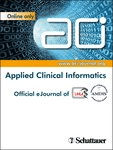
Applied Clinical Informatics
Empowering clinical excellence with technology-driven insights.Applied Clinical Informatics is a leading journal dedicated to the expanding field of health informatics and its applications within clinical settings. Published by GEORG THIEME VERLAG KG in Germany, this journal serves as a pivotal platform for researchers and professionals engaged in the integration of technology and healthcare, aiming to improve patient outcomes through innovative informatics solutions. With a solid Q2 ranking in multiple disciplines including Computer Science Applications, Health Informatics, and Health Information Management, it reflects its prominent position in the academic landscape. The journal provides accessible content while fostering dialogue on key issues and advancements in clinical informatics. Covering a wide array of topics from data management to e-health applications, Applied Clinical Informatics is essential reading for those looking to stay attuned to the latest research and developments from 2009 to 2024, enriching the knowledge base of students, professionals, and researchers worldwide.

Lancet Digital Health
Transforming Health Systems with Cutting-Edge Research.Lancet Digital Health is an esteemed Open Access journal published by ELSEVIER, dedicated to advancing the interdisciplinary field of digital health. Since its inception in 2019, the journal has rapidly established itself as a leading platform for disseminating high-quality research focusing on the implications of digital technology in healthcare delivery, health informatics, and patient management. Renowned for its rigorous peer-review process and commitment to academic excellence, Lancet Digital Health currently holds prestigious Q1 rankings across multiple categories including Decision Sciences, Health Informatics, and Medicine (miscellaneous) as of 2023. With an impressive impact in its field—ranked #1 in Health Informatics and within the top percentile of related disciplines—this journal offers vital insights into the ongoing transformations within health systems globally. Researchers, healthcare professionals, and students alike will find a wealth of cutting-edge studies, practical applications, and discussions on the future of digital health, fostering an evidence-based dialogue that is essential in today's rapidly evolving medical landscape.
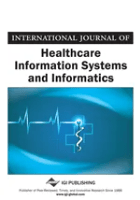
International Journal of Healthcare Information Systems and Informatics
Transforming healthcare through innovative information systems.International Journal of Healthcare Information Systems and Informatics is a prestigious academic journal published by IGI Global, focusing on the vital intersection of healthcare and information technology. With an ISSN of 1555-3396 and E-ISSN of 1555-340X, this journal serves as a pivotal platform for researchers, professionals, and students to explore innovative solutions and advancements in healthcare informatics. As of 2023, it holds a commendable Q3 ranking in categories such as Information Systems and Medicine, highlighting its significant contribution to the academic community. Covering a wide range of topics from healthcare data management to the implementation of information systems in clinical settings, the journal aims to foster critical discussions and disseminate impactful research. With a publication history spanning from 2006 to 2024, it continues to play a crucial role in guiding the future of healthcare information systems. Readers can access this journal through traditional subscription methods, ensuring that leading-edge research reaches those most invested in the evolution of healthcare informatics.
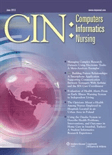
CIN-COMPUTERS INFORMATICS NURSING
Pioneering the Future of Nursing and Information TechnologyCIN-COMPUTERS INFORMATICS NURSING is a distinguished journal that publishes cutting-edge research at the intersection of nursing and information technology. Published by Lippincott Williams & Wilkins, the journal has been a pivotal platform since 2002, catering to the needs of health informatics professionals and nursing researchers. With an impressive impact factor and ranked within Q2 in Nursing (miscellaneous) and other relevant categories, it serves as a key resource for advancing knowledge and best practices in the field. The journal's inclusion in important databases ensures broad visibility and access to the latest findings that influence healthcare delivery. CIN-COMPUTERS INFORMATICS NURSING welcomes a diverse range of articles, including empirical studies, reviews, and innovative methodology approaches, making it an invaluable asset for clinicians, educators, and scholars dedicated to enhancing nursing informatics and improving patient outcomes.

BMC Medical Informatics and Decision Making
Advancing healthcare through innovative informatics.BMC Medical Informatics and Decision Making is a leading journal in the fields of medical informatics and health policy, published by BMC since its inception in 2001. With an impressive impact factor reflecting its status as a Q1 journal in both Computer Science Applications and Health Informatics, it serves as a vital resource for researchers, professionals, and students dedicated to advancing healthcare through informatics. The journal is committed to disseminating high-quality, peer-reviewed research focused on the innovative use of information technology in healthcare, decision-making processes, and policy formulation. As an Open Access platform, it ensures that findings are widely accessible and can foster collaboration across various disciplines. Positioned at the cutting edge of health informatics, BMC Medical Informatics and Decision Making aims to influence practice and inspire new research directions, making it an essential publication for anyone involved in improving health systems worldwide.

BMJ Health & Care Informatics
Advancing Knowledge at the Intersection of Health and DataBMJ Health & Care Informatics, published by the esteemed BMJ Publishing Group, stands at the forefront of the rapidly evolving field of health informatics. Established as an Open Access journal in 2019, it is dedicated to disseminating high-quality research that enhances the integration of health care with information technologies. With a prominent Q1 ranking in 2023 across categories such as Computer Science Applications, Health Informatics, and Health Information Management, this journal serves as an essential resource for researchers and practitioners alike. The journal is indexed in reputable databases and boasts impressive Scopus ranks—notably, it is placed #43 among Health Informatics journals. The aim is to foster innovation and understanding in health care practices through rigorous research and collaboration. Encompassing a wide spectrum of topics within health data science, usability, and outcomes research, BMJ Health & Care Informatics is pivotal for anyone involved in advancing health care through technology.
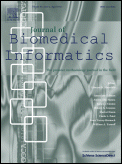
JOURNAL OF BIOMEDICAL INFORMATICS
Transforming biomedical research with cutting-edge informatics.JOURNAL OF BIOMEDICAL INFORMATICS, published by Academic Press Inc. Elsevier Science, is a premier peer-reviewed journal dedicated to the integration of computer science and health informatics to advance the field of biomedical engineering and healthcare. With its ISSN 1532-0464 and E-ISSN 1532-0480, this influential journal has established itself with an impressive impact factor, reflecting its high-quality research contributions. Recognized within the top quartile (Q1) of both Computer Science Applications and Health Informatics for 2023, the journal ranks #135 out of 817 in Computer Science Applications and #25 out of 138 in Health Informatics according to Scopus metrics. Offering open access options, it fosters extensive dissemination and accessibility of groundbreaking research findings to the scientific community. As a scholarly platform from 2001 to 2024, it is engineered to cater to the educational needs of researchers, professionals, and students, promoting innovative studies that bridge the gap between technology and healthcare.
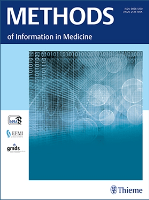
METHODS OF INFORMATION IN MEDICINE
Unlocking New Possibilities in Medical Knowledge Dissemination.METHODS OF INFORMATION IN MEDICINE, published by Georg Thieme Verlag KG, stands at the forefront of medical knowledge dissemination, pushing the boundaries of Advanced and Specialized Nursing, Health Informatics, and Health Information Management. Established in 1962, this prestigious journal has continuously evolved to address the dynamic landscape of healthcare and information technology, aiming to bridge the gap between clinical practice and innovative information technologies. With a robust impact factor reflected in its 2023 Scopus rankings, where it holds a commendable position in Q1 for Advanced Nursing, it serves as an invaluable resource for researchers, practitioners, and students alike. While it maintains a subscription-based access model, the journal fosters the exchange of pioneering methodologies and transformative ideas that are crucial for advancing healthcare delivery and improving patient outcomes. Explore the latest research, expert insights, and cutting-edge developments that solidify the journal’s role as a leader in the interdisciplinary approach to medicine and information systems.
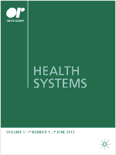
Health Systems
Empowering research to transform healthcare systems.Health Systems is a vital journal dedicated to advancing the understanding and application of health system dynamics, innovations, and policies. Published by Taylor & Francis Ltd, this journal has established a reputation as a significant contributor in the fields encompassing Computer Science Applications, Health Informatics, and Health Policy, among others. With a Q3 category ranking in various relevant disciplines and notable percentile rankings in health policy and management sciences, Health Systems serves as a robust platform for researchers and practitioners to publish their findings and foster interdisciplinary dialogues. The journal attracts a diverse audience committed to improving health systems through empirical research and theoretical developments. It continuously evolves, reflecting contemporary challenges and innovations from 2012 to 2024, making it an indispensable resource for those invested in the future of healthcare.

JMIR Medical Informatics
Unlocking the Potential of Medical Data for Better OutcomesJMIR Medical Informatics is a leading open access journal dedicated to the field of medical informatics, published by JMIR Publications, Inc. since 2013 in Canada. With an impressive impact factor and a distinguished Q2 ranking in both Health Informatics and Health Information Management categories, this journal plays a pivotal role in disseminating cutting-edge research and innovative practices. Covering a wide scope that includes clinical informatics, health information systems, and data analytics, JMIR Medical Informatics provides valuable insights for researchers, practitioners, and policymakers alike. The journal is accessible to a global audience, ensuring that pioneering studies and methodologies reach those who can apply them to enhance health outcomes. With its commitment to advancing the body of knowledge in medical informatics, this journal stands as a vital resource for anyone involved in or studying the intersection of healthcare and technology.